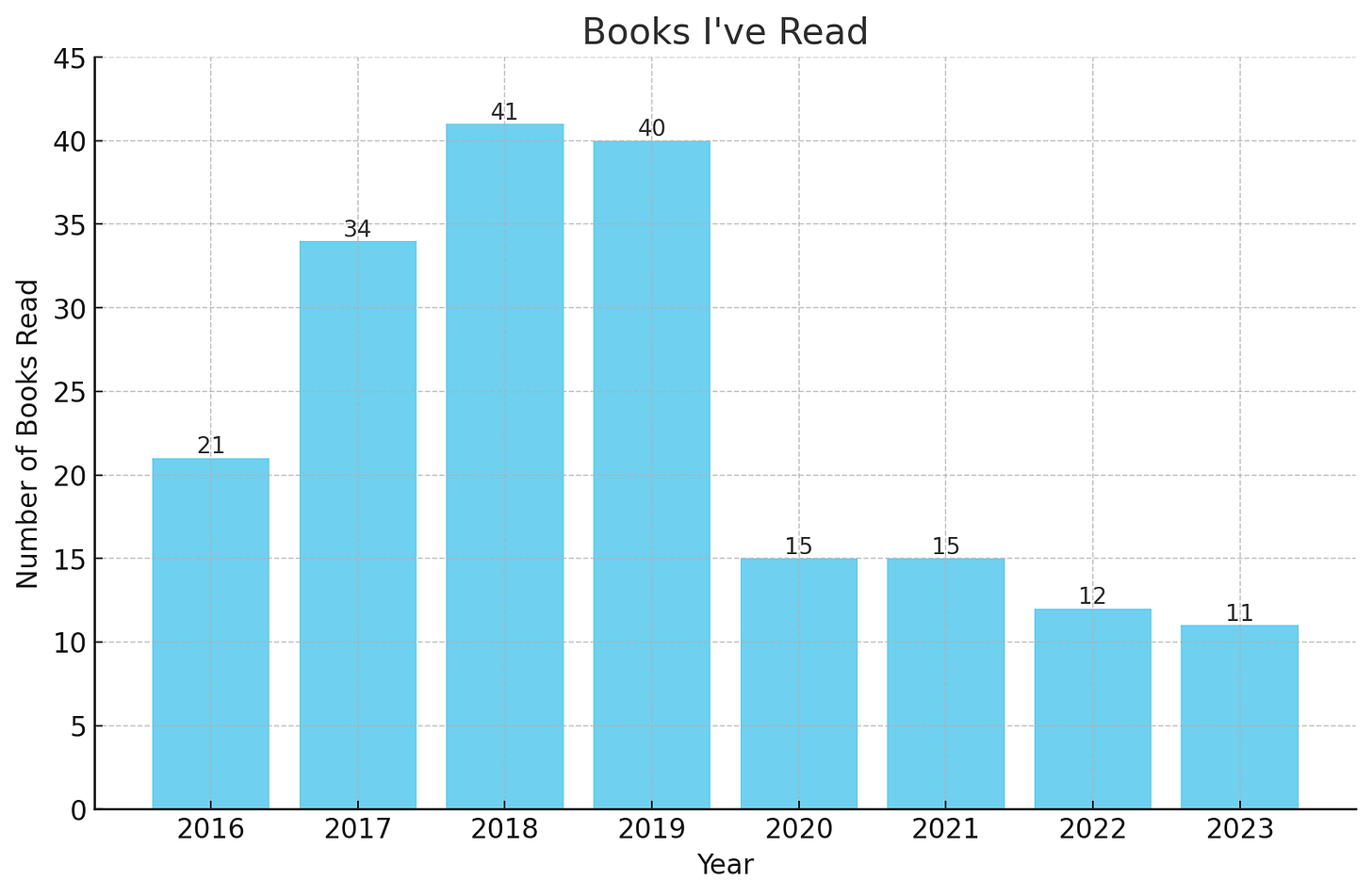This is a weekly newsletter about the art and science of building and investing in tech companies. To receive Investing 101 in your inbox each week, subscribe here:
From Reading To Writing And Beyond
In 2019, I read 40 books, and only ~5 of them were audiobooks. In 2023, I read 11 books and 7 of them were audiobooks. Suffice it to say, my reading habits have changed dramatically. It’s very clear that COVID was the trend disruption.
For a few years there, I was reading ~30-40 books per year, and I attribute a lot of that to having a pretty consistent 30-40 minute commute each way. Once I started working from home, I lost that reading time. And I never ended up finding another space for it in my life.
For a long time, I was focused on the volume of reading. Granted, I’d like to say that my precipitous drop off has been due to a focus on quality of reading, but that really isn’t true.
Before I start reflecting on the change in my reading habits, its first important to clearly state how important reading is to me. In particular, as a parent, reading hits home.
I enjoy every time I see my kids reading. Everywhere we go, every day out we have, I try to make a stop at a bookstore. I’m not too sharp, smart, or smooth, but the best I can do is expose my kids to as many ideas as possible.
This isn’t the first time I’ve spent reflecting on reading and writing in my life. I’ve written here and here, thinking more about my reading habits and the way writing has taken over a lot of it:
“The majority of my reading falls into three buckets:
(1) What I read for my investing work, which is usually deal-related and so I avoid talking about.
(2) What I read as part of managing Contrary Research, which you can always read here.
(3) What I read so that I can include it in whatever I'm writing about that week.So I read plenty each week. But I feel a hunger for ideas and concepts that I glance, but never conceive. I want to read more, not so I can tally more books on my "Books I Read" list at the end of the year. I want to read more because I can feel categories of limitations in my own understanding.”
But my conclusion continues to be not that I’m fine with what I’m reading. Its that I still need to find more room in my life to read more and more. My favorite strategy is what Ryan Holiday has to say about reading:
“You should always have a book with you. Always. People often assume something about me: that I’m a speed reader. It’s the most common email I get. They see all the books I recommend every month in my reading newsletter and assume I must have some secret. They want to know my trick for reading so fast. The truth is, even though I read hundreds of books each year, I actually read quite slow. In fact, I read deliberately slow. But what I also do is read all the time. I am always carrying a book with me. Every time I get a second, I crack it open. I don’t install games on my phone—that’s time for reading. When I’m eating, on a plane, in a waiting room, or sitting in traffic in an Uber—I read. There’s no trick, no secret, no shortcut. I like B.H. Liddell Hart’s old line that sometimes the longest way around is the shortest way home. If you put the time in, you get the results.”
So, while I lick my wounds and reflect on how to make more room for reading, I still wanted to reflect on some of the themes this year.
Themes
Fiction
Every year as I’ve looked back on what I’ve read, I keep getting reminded of this Twitter interaction I had in 2020.

In 2020, I didn’t read a single fiction book. In 2021, to rectify that, I finally gave in to my brother’s recommendation that I check out Brandon Sanderson. And boy, did I fall in love. I read 15 books in 2021, and 6 of them were Brandon Sanderson books. Since then, I’ve read 16 books by Sanderson. Granted, all of them audiobooks.
In particular, fantasy was a specific choice. I was really just trying to expose myself to more fiction. But previously, in 2019, my brother and I had a book club called “The Fiction of Future” where would read near-future science fiction. Fantasy is unique in that it strips away any of the pragmatic realism. Instead, it crystalizes the human experience. The stories of people with values, characteristics, and quirks.
I’ve enjoyed having a healthy diet of fiction in my repertoire. Going forward, I’m going to try and expand that pool of fiction back into more science fiction and some of the categories I’ve read in the past.
Playbooks
What books are left after you take out all the fiction, there isn’t much. But between Talent, The Power Law, and The Navalmanack, you start see these crystallized lessons from practitioners. I’ve written before about the professionalization of startups:
“If you step back and look at the breadth of startup experience that people have today you'll start to appreciate two things. First, it's impressive the kinds of incredible experience people have now built up. And second, we're really just getting into the first generation of that experience being widespread.”
I’m a big fan of instances where these exceptional people put pen to paper to capture the learned experience they’ve collected. Regardless of the discipline, there’s a superpower in learning from other people’s experiences. Especially their mistakes.
To read my full list of books I read in 2023, check out this post on my personal site.
Thanks for reading! Subscribe here to receive Investing 101 in your inbox each week:







thanks for sharing, this is very interesting. also reflected lately on my reading style. which will help me improve tremendously next year. excited already: https://k7v.in/how-i-read
This has been a fun one to read and I reached my goal of reading 10 books last year and excited for what I will be reading this year! Definitely adding fiction to my list